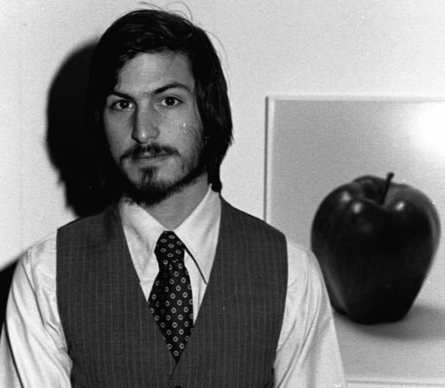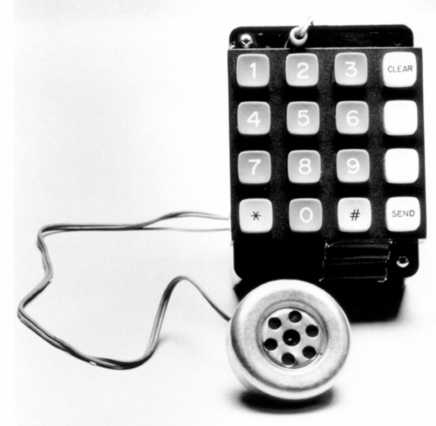| Steve Jobs and the Early Apple Years |
Page 1 of 3
The role of the computer specialist in creating both software and hardware is obvious. Without the technically skillful there would be no computing products for us to use. But what about the marketing side of the product? It isn't enough to know how to design novel electronics, you also have to recognize the need to package the whole concept into a form that people will want to buy and use. Without this additional skill the personal computer would still be the un-boxed printed circuit board littered with wires and extra bits that made and kept it the preserve of the hobbyist for the first few years of its life. Many credit Apple, and in particular its co-founder Steve Jobs with the role of turning the rough and ready electronics into the consumer product of the 80's and 90's. Moving into the 21st century it was Steve Jobs who pioneered the iPhone putting undreamed-of computing power into a pocket device.
Steve Jobs, February 24, 1955 - October 5, 2011
Steve Jobs is a strange character and perhaps a difficult character to understand in today's culture. He was born into the California of the mid fifties and was exposed to the revolution in thought, tastes and freedoms of the 60s. From today's perspective it seems nothing more that quaint nostalgia to talk of flower power, counter culture, tripping out and dropping acid, but at the time it all seemed very serious and very threatening to the the `establishment'. California was a focus of a great deal of this revolutionary energy but Steve lived in Silicon Valley and had a slightly different view of it all. It was the time of `garage startups'. There was a lot of money to be made from electronics and all you needed was skill and the desire to work hard. The role model was Hewlett and Packard who had teamed up to build high quality electronics in a garage. The myth of the lone `wirehead' working late nights to build some impossible machine in the basement or garage was to persist to the end of the twentieth century. In this environment it was inevitable that Steve should become interested in electronics. But he never really managed to get into the formal theory of what was going on. He fitted the mould of the bright but impatient student who was always in too much of a hurry to do the ground work - the boring bits. He also believed that he knew everything that there was to know about electronics - until he met Woz. The Two StevesSteve Wozniak was older but he was a natural designer. He not only knew the theory but had the extra special skill of being able to simplify circuits by using components in clever ways and by making one component do double duty. This sort of skill is rare and the only other obvious and well known example is Clive Sinclair in the UK. Woz could hold a circuit design in his head and minimize it in a way that would make other designers admire the result. Steve and Woz became friends - although `friends' is a gross over simplification for the complex interaction between the two Steves. In the early 70's the hot topics were sex, drugs, Vietnam and phone phreaking. By sending the right audio tones you could gain control of the long distance trunk lines and make international calls for free. The `phone phreak' was a counter culture hero, part of the `power to the people' ethic and a technologically hip one at that. Steve and Woz were drawn to it like a magnet. Woz designed an amazingly neat digital `blue-box' to generate the necessary tones - and Steve decided they could make money selling it. The clandestine sales operation of the illegal `blue-boxes' went well and perhaps planted the seed in Steve's mind that electronics could be fun and profitable.
A "blue" box Indian influenceAlthough Steve Jobs was well able to understand and participate in the `wire-head' culture he also pursued more mainstream interests. The best way to describe him is as a `hippy' - although there were many different varieties of the species. Steve was particularly into Zen and alternative religions, food fads, fasting, smoking pot and taking acid. He didn't wash and went around barefoot most of the time. He applied for a job with Atari - and got one! This is a good indicator of how strange a company Atari was at the time but the saga of Nolan Bushnell is another, interesting, story. It is said that Woz gave him a prototype Pong game he had constructed and he took it to Atari to show off and they thought he had built it and offered him a job. One condition of his employment was that he would only come into work at night. Steve saved enough money to make the, then fashionable, journey to India. Atari wanted someone to sort out earthing problems in Germany and so they sent Steve. He then took an onward flight to India. The reason for going to India was to seek spiritual enlightenment from the many gurus. The experience was intense and disturbing but Steve found none of the answers he was searching for. In 1974 Steve, back from India and still working the night shift for Atari, got back in touch with Woz. Still interested in the spiritual he toyed with primal therapy and eventually made his way to Zen via the Zen master Kobun Chino (Chino would later become the official `roshi' of Next.) <ASIN:1451648537> <ASIN:1591841984> <ASIN:0393330435> <ASIN:1593270100> <ASIN:0968910807> |
||||
| Last Updated ( Tuesday, 25 February 2025 ) |

